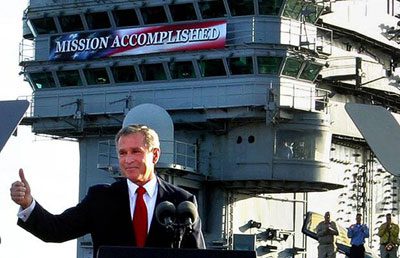
Eleven years ago, then-president George W. Bush stood atop the aircraft carrier USS Abraham Lincoln to announce the end of major combat operations in Iraq. A banner behind him infamously proclaimed “Mission Accomplished.” The United States had invaded Iraq against the advice of all voices of reason around the world.
America has lost more than 4,000 soldiers and $1 trillion in Iraq since then. But the country we invaded more than a decade ago is falling apart today. The Islamic State of Iraq and al-Sham (ISIS), an al-Qaeda-inspired group, captured most of northern Iraq last week, including Mosul, the country’s second biggest city. Other militias openly co-exist with government forces in the rest of the country, and suicide bombings have become routine headlines from Baghdad.
The dreadful present state of Iraq is partly a product of the disastrous decisions made by the U.S. government over the past 11 years. After the invasion, Bush appointed Paul Bremer, an American diplomat, as Iraq’s head of state. One of Bremer’s first decisions was to dismiss the Iraqi army, which mostly did not engage in combat with the invading American troops.
By disbanding the army, Bremer put 400,000 Iraqis out of work. But Iraq’s temporary American rulers did not stop there. They pursued “De-Baathfication” policies, firing all government employees who were members of the Baath Party of the toppled dictator Saddam Hussein.
The U.S. government did not just topple the regime of Saddam Hussein. It also dismantled the state and left in its wake thousands disgruntled, unemployed Iraqis. How many of those fired government employees now fight for or sympathize with ISIS? Would they have done so if they still had their jobs?
It could be pure lack of intelligence that led the Bush Administration to behave so catastrophically in Iraq. It also could be intended failure, a malicious plan to destroy the Iraqi people and state.
While the sectarianism, incompetence and corruption of the Iraqi government have contributed to the country’s crisis, what is happening in Iraq is not the doing of its own people. When Bush invaded Iraq — against the will of most of the world and without the approval of the United Nations — he turned it into an open arena for terrorism, proxy wars and lawlessness.
Much has been said about what the United States can do today to fix its past mistakes and aid Iraqis against terror. The answer does not lie in Washington alone. Iraq has powerful neighbors that have a great influence on its factions.
President Obama should be as inclusive in helping Iraq, without repeating his predecessor’s mistakes. Bush was divisive and isolating when he decided to invade Iraq unilaterally. Washington should look to correspond its efforts with those of Iran, Saudi Arabia, Turkey and other world powers to find a collective solution to the security of Iraq.
Nobody is immune to the terror in Iraq. Everybody should work collectively to stop it.






Leave a Reply